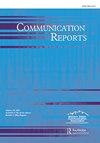网络聊天群中的语言使用和排斥感
IF 1.6
Q3 COMMUNICATION
引用次数: 0
摘要
代词的使用与注意力的集中以及群体认同感和凝聚力有关。这项研究测试了我们和你代词的使用是否与在线聊天群中的排斥感有关。We代词与更高的群体身份有关,如果参与者感到被排斥,它们的使用可能会减少。你代词与分化和疏远有关,它们的使用可能会随着排斥感的增加而增加。参与者在一次在线群聊中讨论了他们对气候变化(研究1)或唐纳德·特朗普总统候选人资格(研究2)的看法。之后,参与者评估了被排斥的感觉。在这两项研究中,感觉更受排斥的参与者使用了更多的你代词,而不是更少的我们代词。本文章由计算机程序翻译,如有差异,请以英文原文为准。
Language Use and Feelings of Ostracism in an Online Chat Group
Pronoun use has been linked to focus of attention and feelings of group identity and cohesion. This study tests if the use of we and you pronouns are related to feelings of ostracism in an online chat group. We pronouns have been linked to higher group identity, and their use may decrease if participants feel ostracized. You pronouns have been linked to differentiation and distancing, and their use may increase with feelings of ostracism. Participants discussed their views about climate change (study 1) or the presidential candidacy of Donald Trump (study 2) in an online group chat. Afterward, participants assessed feelings of ostracism from the group. In both studies, participants who felt more ostracized used more you pronouns but not fewer we pronouns.
求助全文
通过发布文献求助,成功后即可免费获取论文全文。
去求助
来源期刊

Communication Reports
COMMUNICATION-
CiteScore
3.70
自引率
0.00%
发文量
18
期刊介绍:
Communication Reports (CR), published biannually since 1988, is one of two scholarly journals of the Western States Communication Association (WSCA). The journal publishes original manuscripts that are short, data/text-based, and related to the broadly defined field of human communication. The mission of the journal is to showcase exemplary scholarship without censorship based on topics, methods, or analytical tools. Articles that are purely speculative or theoretical, and not data analytic, are not appropriate for this journal. Authors are expected to devote a substantial portion of the manuscript to analyzing and reporting research data.
 求助内容:
求助内容: 应助结果提醒方式:
应助结果提醒方式:


